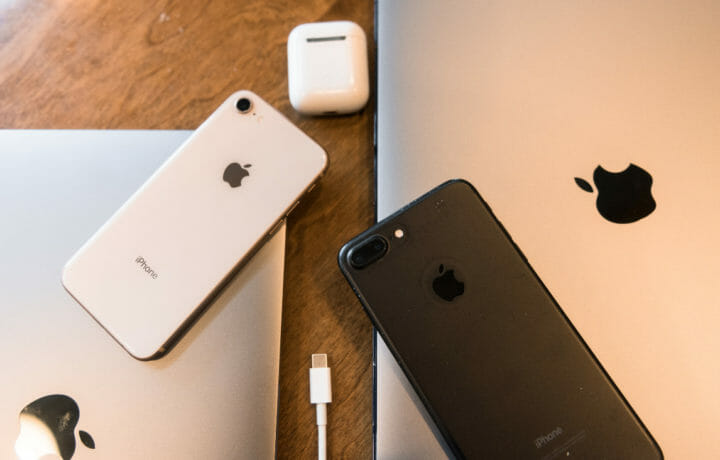The Department of Justice announced last week that they’re suing Apple for monopolizing the smartphone market.
The DOJ, joined by 16 state and district attorneys, filed a civil antitrust lawsuit. The suit states that Apple violates Section 2 of the Sherman Act for monopolization or attempted monopolization of the smartphone markets.
Why go after Apple?
According to the release, “the complaint, filed in the U.S. District Court for the District of New Jersey, alleges that Apple illegally maintains a monopoly over smartphones by selectively imposing contractual restrictions on, and withholding critical access points from, developers.”
The suit continued by accusing Apple of undermining apps, products, and services that would make users ‘less reliant’ on the iPhone, promote interoperability, and lower costs for consumers and developers.
Through this monopolization lawsuit, the Justice Department and state attorneys general are seeking relief to restore competition to these markets on behalf of the American public.
Is Apple above the law?
“Consumers should not have to pay higher prices because companies violate the antitrust laws,” said Attorney General Merrick B. Garland, in the press release. “We allege that Apple has maintained monopoly power in the smartphone market, not simply by staying ahead of the competition on the merits, but by violating federal antitrust law. If left unchallenged, Apple will only continue to strengthen its smartphone monopoly.
“No matter how powerful, no matter how prominent, no matter how popular — no company is above the law,” said Deputy Attorney General Lisa Monaco. “Through today’s action, we reaffirm our unwavering commitment to that principle.”
“When corporations engage in anticompetitive conduct, the American people and our economy suffer,” said Acting Associate Attorney General Benjamin C. Mizer. “Today’s action against Apple sends a strong signal to those seeking to box out competitors and stifle innovation — that the Justice Department is committed to using every tool available to advance economic justice and root out anticompetitive practices, wherever they arise.”
The complaint alleges that Apple blocked innovative super apps, suppressed mobile cloud streaming services, excluded cross-platform messaging apps, diminished the functionality of non-apple smartwatches, and limited third-party digital wallets.
But what is an antitrust case?
In 1890, Congress passed the first antitrust law, the Sherman Act. The act was a “comprehensive charter of economic liberty aimed at preserving free and unfettered competition as the rule of trade.”
In 1914, Congress passed two more antitrust laws. These were the Federal Trade and Commission Act, which led to the creation of the FTC, and the Clayton Act. These acts and the Sherman Act remain the three core federal antitrust laws.
The Sherman Act
The Sherman Act criminalizes “every contract, combination, or conspiracy in restraint of trade,” and any “monopolization, attempted monopolization, or conspiracy or combination to monopolize.”
Criminal penalties for the Sherman Act include up to $100 million for a corporation, and $1 million for an individual, along with up to 10 years in prison.
The Federal Trade Commission Act
The FTC Act bans “unfair methods of competition and unfair or deceptive acts or practices.”
According to the Supreme Court, all violations of the Sherman Act, also violate the FTC Act. The FTC does not enforce the Sherman Act, but it can bring cases under the FTC Act against the same kinds of activities that violate the Sherman Act.
The Clayton Act
The Clayton Act addresses the practices that the Sherman Act does not. This includes mergers and interlocking directorates, which means the same person making the decisions for competing companies.
Section 7 of the Clayton Act prohibits the merger or acquisition where the effect lessens competition or tends to create a monopoly. The Clayton Act has been amended twice, but in 1976 the requirement for companies planning large mergers or acquisitions to notify the government of these plans was added.
Infamous Antitrust Cases
No company is above the law when it comes to antitrust cases.
AT&T
In 1974, communication giant AT&T had a suit filed against them by the attorney general after several years of uncontrolled monopolization of the market. The company was considered a “natural” monopoly due to patents and specific rights that it acquired.
It took seven years and four attorney generals before this case was settled by AT&T agreeing to be broken down into seven different companies, responsible for serving different regions of the country.
Since then, five of these companies have merged back into AT&T incorporated.
Kodak
Kodak was and still is a household name when it comes to capturing moments and has even spread to other types of technology. But at one point, Kodak had a 96% stranglehold share of the market in the US.
In 1921, the Kodak ‘monopoly’ was targeted by several parties, both private and federal, with antitrust lawsuits. The result was that Kodak would only be allowed to sell its film and not retain a monopoly on all film produced.
Another lawsuit was created after Kodak developed colored film since they were the only company that knew how to manufacture and process it.
Kodak would charge companies fees to process and deliver the film back to them. The result of the suit was that companies could license colored film from Kodak. In 1994, these mandates were canceled due to the shift in economic conditions in the US market.
Microsoft
In 1999, the DOJ issued findings that Microsoft had a monopoly on PC operating systems, and the company had worked to ensure that it retained the hold on the market through various tactics.
According to the US government, Microsoft had committed violations of the first two sections of the Sherman Act. The case was based on the issue of OS and Browser sales for Intel Chip-based PCs.
Microsoft had started bundling Windows with Internet Explorer, which removed the need for other browser software. This eliminated the need and priced out any competition.
This bundle is allegedly what won Microsoft’s victory in the first ‘browser war’.



